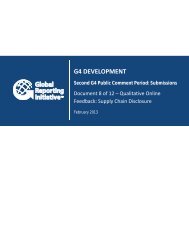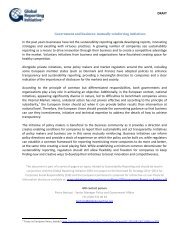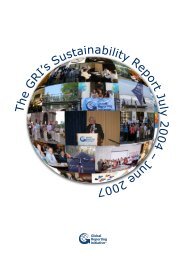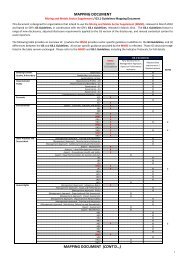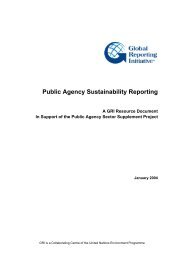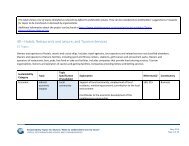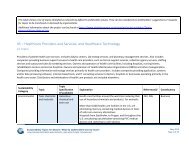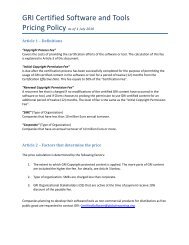Event Organizers Sector Supplement - Global Reporting Initiative
Event Organizers Sector Supplement - Global Reporting Initiative
Event Organizers Sector Supplement - Global Reporting Initiative
Create successful ePaper yourself
Turn your PDF publications into a flip-book with our unique Google optimized e-Paper software.
Human Rights<br />
There is growing global consensus that organizations have<br />
the responsibility to respect human rights. Human rights<br />
Performance Indicators require organizations to report on<br />
the extent to which processes have been implemented,<br />
on incidents of human rights violations and on changes<br />
in the stakeholders’ ability to enjoy and exercise their<br />
human rights, occurring during the reporting period.<br />
Among the human rights issues included are nondiscrimination,<br />
gender equality, freedom of association,<br />
collective bargaining, child labor, forced and compulsory<br />
labor, and indigenous rights.<br />
The international legal framework for human rights<br />
is comprised of a body of law made up of treaties,<br />
conventions, declarations and other instruments. The<br />
corner stone of human rights is the International Bill of<br />
Rights which is formed by three instruments:<br />
i) the Universal Declaration of Human Rights (1948);<br />
ii)<br />
iii)<br />
the International Covenant on Civil and Political<br />
Rights (1966); and<br />
the International Covenant on Economic, Social and<br />
Cultural Rights (1966).<br />
These are the first reference points for any organization<br />
reporting on human rights. In addition to these three key<br />
instruments, the international legal framework for human<br />
rights is underpinned by over 80 other instruments:<br />
ranging from soft declarations and guiding principles<br />
to binding treaties and conventions, and ranging from<br />
universal instruments to regional.<br />
Organizations can affect a wide range of human rights. In<br />
assessing which human rights are relevant for reporting,<br />
an organization should consider all human rights.<br />
Some additional instruments which may be useful for a<br />
reporting organization to reflect upon are:<br />
• ILO Declaration on Fundamental Principles and<br />
Rights at Work (1998) (which builds upon the<br />
eight core Conventions of the ILO consisting of<br />
Conventions 100, 111, 87, 98, 138, 182, 29, 105) 9 ;<br />
• The regional conventions, adhering to the principle<br />
of universality in the International Bill of Rights, for<br />
areas where the organization operates, including:<br />
the African Charter on Human and Peoples Rights<br />
(1981), the Arab Charter on Human Rights (1994),<br />
the American Convention on Human Rights (1969),<br />
the European Convention on Human Rights (ECHR)<br />
(1950); and<br />
• Conventions protecting the rights of individuals<br />
who may be impacted by the organization’s work,<br />
including but not limited to the Convention on<br />
the Elimination of Discrimination Against Women<br />
(CEDAW) (1979), the Convention on the Rights of<br />
the Child (1989), the International Convention on<br />
the Elimination of All Forms of Racial Discrimination<br />
(1966), ILO Convention 107 Indigenous and Tribal<br />
Populations Convention (1957), ILO Convention<br />
169 Concerning Indigenous and Tribal Peoples<br />
in Independent Countries (1991), UN Declaration<br />
on the Rights of Indigenous Peoples (2007)<br />
and Convention on the Rights of Persons with<br />
Disabilities (2007).<br />
It is important to note that many Aspects that provide<br />
insight into human rights performance can be found in<br />
other Indicator Categories in the Guidelines, and are not<br />
limited to the Human Rights Indicators Category.<br />
Disclosure on Management Approach<br />
Provide concise disclosure on the implementation of<br />
due diligence processes on the following Management<br />
Approach items, with reference to the human rights<br />
Aspects listed below.<br />
The primary reference points should be the ILO<br />
Tripartite Declaration Concerning Multinational<br />
Enterprises and Social Policy and the Organisation for<br />
Economic Cooperation and Development Guidelines for<br />
Multinational Enterprises.<br />
• Investment and Procurement Practices;<br />
• Non-discrimination;<br />
• Freedom of Association and Collective Bargaining;<br />
• Child Labor;<br />
• Prevention of Forced and Compulsory Labor;<br />
• Security Practices;<br />
• Indigenous Rights;<br />
• Assessment; and<br />
• Remediation.<br />
Goals and Performance<br />
Organization-wide goals regarding performance relevant<br />
to the human rights Aspects, indicating their linkage to<br />
the international declarations and standards listed in the<br />
introduction.<br />
48





